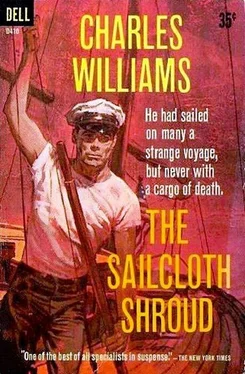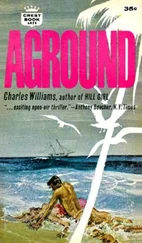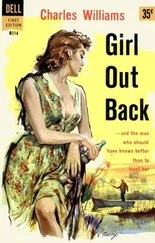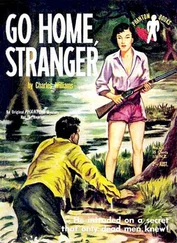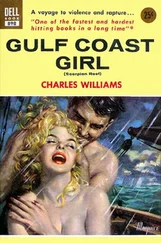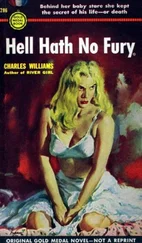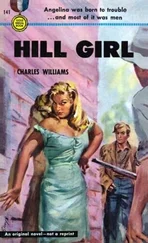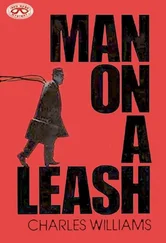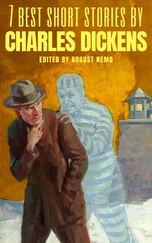Charles Williams - The Sailcloth Shroud
Здесь есть возможность читать онлайн «Charles Williams - The Sailcloth Shroud» весь текст электронной книги совершенно бесплатно (целиком полную версию без сокращений). В некоторых случаях можно слушать аудио, скачать через торрент в формате fb2 и присутствует краткое содержание. Год выпуска: 2010, Жанр: Старинная литература, на английском языке. Описание произведения, (предисловие) а так же отзывы посетителей доступны на портале библиотеки ЛибКат.
- Название:The Sailcloth Shroud
- Автор:
- Жанр:
- Год:2010
- ISBN:нет данных
- Рейтинг книги:3 / 5. Голосов: 1
-
Избранное:Добавить в избранное
- Отзывы:
-
Ваша оценка:
- 60
- 1
- 2
- 3
- 4
- 5
The Sailcloth Shroud: краткое содержание, описание и аннотация
Предлагаем к чтению аннотацию, описание, краткое содержание или предисловие (зависит от того, что написал сам автор книги «The Sailcloth Shroud»). Если вы не нашли необходимую информацию о книге — напишите в комментариях, мы постараемся отыскать её.
The Sailcloth Shroud — читать онлайн бесплатно полную книгу (весь текст) целиком
Ниже представлен текст книги, разбитый по страницам. Система сохранения места последней прочитанной страницы, позволяет с удобством читать онлайн бесплатно книгу «The Sailcloth Shroud», без необходимости каждый раз заново искать на чём Вы остановились. Поставьте закладку, и сможете в любой момент перейти на страницу, на которой закончили чтение.
Интервал:
Закладка:
He grinned cockily, and took the wheel. “This bedpan? I could steer it with a canoe paddle. What’s the course?”
“Full-and-by,” I told him.
“What’s that?”
“It’s a term seamen use,” I said. “Mr. Baxter’ll explain it to you while I make some coffee.”
I made sandwiches at noon and took the helm. The breeze freshened and hauled almost a point to the eastward. Baxter relieved me at four with the mountains of Panama growing hazier and beginning to slide into the sea astern. She was heeled over sharply with all sail set, lifting to the sea with a long, easy corkscrew motion as water hissed and gurgled along the lee rail with that satisfying sound that meant she was correctly trimmed and happy and running down the miles. Spray flew aft and felt cool against our faces. When he took the wheel I looked aloft again and then eyed the main sheet with speculation. He smiled, and shook his head, and I agreed with him. You couldn’t improve on it.
“What’s her waterline length?” he asked.
“Thirty-four,” I said.
There is a formula for calculating the absolute maximum speed of a displacement hull, regardless of the type or amount of power applied. It’s a function of the trochoidal wave system set up by the boat and is 1.34 times the square root of the waterline length. I could see Baxter working this out now.
“On paper,” I said, “she should do a little better than seven and a half knots.”
He nodded. “I’d say she was logging close to six.”
As I went below to start supper I saw him turn once and look astern at the fading coastline of Panama. When he swung back to face the binnacle, there was an expression of relief or satisfaction in the normally grave brown eyes.
The breeze went down a little with the sun, but she still sang her way along. Keefer took the eight-to-twelve watch and I slept for a few hours. When I came on deck at midnight there was only a light breeze and the sea was going down. . . .
“What the hell is this?” Bonner demanded. He came over in front of us. “Are we going to sail that lousy boat up from Panama mile by mile?”
“Foot by foot, if we have to,” Slidell said crisply, “till we find out what happened.”
“You’ll never do it this way. The machine’s no good. He fooled it the first time.”
Flowers stared at him with frigid dislike. “Nobody beats this machine. When he starts to lie, it’ll tell us.”
“Yeah. Sure. Like it did when he said Baxter died of a heart attack.”
“Shut up!” Slidell snapped. “Get back out of the way. Take the girl to the kitchen and tell her to make some coffee. And keep your hands off her.”
“Why?”
“It would be obvious to anybody but an idiot. I don’t want her screaming and upsetting Rogers’ emotional response.”
We’re all crazy, I thought. Maybe everybody who had any contact with Baxter eventually went mad. No, not Baxter. His name was Reagan. I was sitting here hooked up to a shiny electronic gadget like a cow to a milking machine while an acidulous gnome with popeyes extracted the truth from me—truth that I apparently no longer even knew myself. I hadn’t killed Reagan. Even if I were mad now, I hadn’t been then. Every detail of the trip was clear in my mind. But how could it be? The machine said I was trying to hide something. What? And when had it happened? I put my hands up to my face, and it hurt everywhere I touched it. My eyes were swollen almost shut. I was dead tired. I looked at my watch, and saw it was nearly two p.m. Then it occurred to me that if they had arrived five minutes later I would already have called the FBI. That was nice to think about now.
Bonner jerked his head, and Patricia Reagan arose from the couch and followed him into the kitchen like a sleepwalker, or some long-legged mechanical toy.
“You still have plenty of paper?” Slidell asked Flowers. The latter nodded.
“All right, Rogers,” Slidell said. He sat down again, facing me. “Reagan was still alive the morning of the second day—”
“He was alive until after three-thirty p.m., of the fourth day.”
He cut me off. “Stop interrupting. He was alive the morning of the second day, and he still hadn’t said anything about putting him ashore?”
“Not a word,” I said.
He nodded to Flowers to start the paper again. “Go on.”
We went on. The room was silent except for the sound of my voice and the faint humming of the air-conditioner. Graph paper crawled slowly across the face of the instrument from one roll to another while the styli kept up their jagged but unvarying scrawls.
Dawn came with light airs and a gently heaving sea, and we were alone with no land visible anywhere. As soon as I could see the horizon, Baxter relieved me so I could take a series of star sights. I worked them out under the hooded light of the chart table while Keefer snored gently in the bunk just forward of me. Two of them appeared to be good. We were eighty-four miles from Cristobal, and had averaged a little better than four and a half knots. We’d made slightly more leeway than I’d expected, however, and I corrected the course.
At seven I called Keefer and began frying eggs and bacon. When I was getting them out of the refrigerator, I noticed it was scarcely more than cool inside and apparently hadn’t been running the way it should. After breakfast I checked the batteries of the lighting system, added some distilled water, and ran the generator for a while. We were shaking down to the routine of sea watches now, and Baxter and I were able to get a couple of hours’ sleep while Keefer took the morning watch from eight to twelve. He called me at eleven-thirty.
I got a good fix at noon that put us a little over a hundred miles out from Cristobal. Baxter took the wheel while I worked it out, and Keefer made a platter of thick sandwiches with canned corned beef and slices of onion. I ate mine at the wheel after I took over for the twelve-to-four trick. I threw the empty milk carton overboard, watched it fall astern as I tried to estimate our speed, and lighted a cigarette. I was content; this was the way to live.
It was a magnificent day. The wind had freshened a little since early morning and was a moderate easterly breeze now, directly abeam as she ran lightfooted across the miles on the long reach to the northward, heeled down with water creaming along the rail. The sun shone hotly, drying the spray on my face and arms, and sparkling on the face of the sea as the long rollers advanced, lifted us, and went on. I started the main sheet a little, decided it had been right before, and trimmed it again. Baxter came on deck just as I finished. He smiled. “No good sailor is ever satisfied, I suppose.”
I grinned. “I expect not. But I thought you’d turned in. Couldn’t you sleep?”
“A day like this is too beautiful to waste,” he replied. “And I thought I’d get a little sun.”
He was wearing a white bathrobe with his cigarettes and lighter in one of the pockets. He lighted a cigarette, slipped off the robe, rolled it into a pillow, and stretched out in the sun along the cushions in the starboard side of the cockpit, wearing only a pair of boxer shorts. He lay feet forward, with his head about even with the wheel. He closed his eyes.
“I was just looking at the chart,” he said. “If we keep on logging four to five knots we should be up in the Yucatan Channel by Sunday.”
“There’s a chance,” I said idly. Sunday or Monday, it didn’t really matter. I was in no hurry. You trimmed and started the sheets and steered and kept one eye forever on the wind as if that last fraction of a knot were a matter of life or death, but it had nothing to do with saving time. It was simply a matter of craftsmanship, of sailing a boat rather than merely riding on it.
Читать дальшеИнтервал:
Закладка:
Похожие книги на «The Sailcloth Shroud»
Представляем Вашему вниманию похожие книги на «The Sailcloth Shroud» списком для выбора. Мы отобрали схожую по названию и смыслу литературу в надежде предоставить читателям больше вариантов отыскать новые, интересные, ещё непрочитанные произведения.
Обсуждение, отзывы о книге «The Sailcloth Shroud» и просто собственные мнения читателей. Оставьте ваши комментарии, напишите, что Вы думаете о произведении, его смысле или главных героях. Укажите что конкретно понравилось, а что нет, и почему Вы так считаете.
